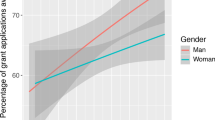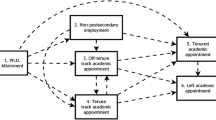Abstract
Utilizing a survey conducted in 2016 by the Chinese Academy of Science and Technology for Development, this study explores the effects of parenthood on the likelihood of the scientist’s first application for the Young Investigator Grant Program administered by the National Science Foundation of China. The analysis indicates that having a child negatively affects scientists’ probability of application. However, this parenthood effect varies by scientist’s gender and child’s age. While women scientists are more adversely affected by having a young child, men scientists are more adversely affected by having an older child. These gendered parenthood effects are moderated by changes in government policy. Both theoretical and policy implications are discussed.

Similar content being viewed by others
References
Adamo, S.A. (2013) Attrition of women in the biological science: workload, motherhood, and other explanations revisited. BioScience 63(1): 43–48
Aldous, J., Mulligan, G.M. and Bjarnason, T. (1998) Fathering over time: what makes the difference? Journal of Marriage and the Family 60(4): 809–820
Allan, E. (2003) Constructing women’s status: policy discourses of university women’s commission reports. Harvard Educational Review 73(1): 44–72
Allison, P.D. (2014) Event history and survival analysis, 2nd edn, SAGE Publications.
Baker, M. (2010) Choices or constraints? Family responsibilities, gender and academic career. Journal of Comparative Family Studies 41(1): 1–18
Bittman, M. and Wajcman, J. (2000) The rush hour: the character of leisure time and gender equity. Social Forces 79(1): 165–189
Blake, M. and La Valle, I. (2001) Who applies for research funding?: Key factors shaping funding application behaviour among women and men in British Higher Education Institutions, London: National Centre for Social Research. https://wellcomecollection.org/works/qctj6ypv
Bonnekessen, B. (2011) The NSF career-life balance initiative: a critical examination. Journal of Workplace Rights 16(3–4): 299–313
Budig, M.J. and England, P. (2001) The wage penalty for motherhood. American Sociological Review 66(2): 204–225
Calisi, R.M. and Working Group of Mothers in Science. (2018) How to tackle the childcare–conference conundrum, Proceedings of the National Academy of Sciences of the United States of America 115(12): 2845–2849. https://doi.org/10.2307/26508973
Clayton, J. (2011) Fix the system, not the women. Science 331(6015): 349–351
Cole, J.R. and Zuckerman, H. (1987) Marriage, motherhood and research performance in science. Scientific American 256(2): 119–125
Fox, M.F. (1995) 'Women and scientific careers', in S. Jasanoff, G.E. Markle, J.C. Peterson and T. Pinch (eds.) Handbook of science and technology studiesThousand Oaks: SAGE Publications Inc, pp. 205–223.
Fox, M.F. (2005) Gender, family characteristics, and publication productivity among scientists. Social Studies of Science 35(1): 131–150
Fox, M.F. and Faver, C.A. (1985) Men, women, and publication productivity: patterns among social work academics. The Sociological Quarterly 26(4): 537–549
Fox, M.F., Fonseca, C. and Bao, J. (2011) Work and family conflict in academic science: patterns and predictors among women and men in research universities. Social Studies of Science 41(5): 715–735
Fox, M.F. and Gaughan, M. (2021) Gender, family and caregiving leave, and advancement in academic science: effects across the life course. Sustainability 13(12): 6820. https://doi.org/10.3390/su13126820
Goulden, M., Mason, M.A. and Frasch, K. (2011) Keeping women in the science pipeline. The Annals of the American Academy of Political and Social Science 638(1): 141–162. https://doi.org/10.2307/41328583
Gracia, P. (2014) Fathers’ child care involvement and children’s age in Spain: A time use study on differences by education and mothers’ employment. European Sociological Review 30(2): 137–150. https://doi.org/10.1093/esr/jcu037
Grant, L., Kennelly, I. and Ward, K.B. (2000) Revisiting the gender, marriage, and parenthood puzzle in scientific careers. Women’s Studies Quarterly 28(1/2): 62–85
Grant, J. and Low, L. (1997) Women and peer review: an audit of the wellcome trust’s decision-making on grants, London: Wellcome Trust.
Greenhaus, J.H. and Beutell, N.J. (1985) Sources of conflict between work and family roles. Academy of Management Review 10(1): 76–88
Gu, C. (2021) Women scientists in China: current status and aspirations. National Science Review 8(10): nwab101
Heckman, J.J. (1979) Sample selection bias as a specification error. Econometrica 47(1): 153–161
Hunter, L.A. and Leahey, E. (2010) Parenting and research productivity: new evidence and methods. Social Studies of Science 40(3): 433–451
Kelly, K. and Grant, L. (2012) Penalties and premiums: the impact of gender, marriage, and parenthood on faculty salaries in science, engineering and mathematics (SEM) and non-SEM fields. Social Studies of Science 42(6): 869–896
Kyvik, S. (1990) Motherhood and scientific productivity. Social Studies of Science 20(1): 149–160
Kyvik, S. and Teigen, M. (1996) Childcare, research collaboration and gender differences in scientific productivity. Science, Technology and Human Values 21(1): 54–71
Ley, T.J. and Hamilton, B.H. (2008) The gender gap in NIH grant applications. Science 322(5907): 1472–1474
Liang, L. and Lu, S. (2019) The gender differences in family education participation. Journal of Shandong Women’s University 6: 83–89
Long, J.S. (1990) The origins of sex differences in science. Social Forces 68(4): 1297–1316
Lundberg, I. (2012) Gender-differentiated Effects of parenthood on earnings: understanding cross-national variation in the motherhood penalty and fatherhood bonus. LlS Working Papers 576, LIS Cross-National Data Center in Luxembourg
Ma, Y. (2017) The effect of gender composition of research teams on individual researchers’ performance in China. STI Policy Review 8(2): 1–22
Ma, Y., Zhao, Y., Gong, X., Sun, L. and Zheng, Y. (2018) Close the gender gap in Chinese science. Nature 557: 25–27
Marsiglio, W. (1991) Paternal engagement activities with minor children. Journal of Marriage and the Family 53(4): 973–986
Mason, M.A. and Goulden, M. (2002) Do babies matter? The effect of family formation on the lifelong careers of academic men and women. Academe 88(6): 21–27
Mason, M.A., Goulden, M. and Wolfinger, N.H. (2006) 'Babies matter: pushing the gender equity revolution forward', in S.J. Bracken, J.K. Allen and D.R. Dean (eds.) The balancing act: gendered perspectives in faculty roles and work livesSterling, VA: Stylus Publishing, pp. 9–29.
Mervis, J. (2011) NSF touts family-friendly policies as boon to women. Science 333(6051): 1811–1811. https://doi.org/10.1126/science.333.6051.1811
Mize, T. D., Doan, L. and Long, J. S. (2019). A general framework for comparing predictions and marginal effects across models. Sociological Methodology, 49(1), 152–189.
Musick, K., Bea, M.D. and Gonalons-Pons, P. (2020) His and her earnings following parenthood in the United States, Germany, and the United Kingdom. American Sociological Review 85(4): 639–674
Myers, K.R., Tham, W.Y., Yin, Y., Cohodes, N., Thursby, J.G., Thursby, S.P., et al. (2020) Unequal effects of the Covid-19 pandemic on scientists. Nature Human Behavior 4(9): 880–883. https://doi.org/10.1038/s41562-020-0921-y
Pleck, J.H. (1997) 'Paternal involvement: levels, sources, and consequences', in M.E. Lamb (ed.) The role of the father in child developmentNew York: Wiley, pp. 66–103.
Pohlhaus, J.R., Jiang, H., Wagner, R.M., Schaffer, W.T. and Pinn, V.W. (2011) Sex differences in application, success, and funding rates for NIH extramural programs. Academic Medicine 86(6): 759
Raley, S., Bianchi, S.M. and Wang, W. (2012) When do fathers care? Mothers’ economic contribution and fathers’ involvement in child care. American Journal of Sociology 117(5): 1422–1459
Romanin, S. and Over, R. (1993) Australian academics: career patterns, work roles, and family life-cycle commitments of men and women. Higher Education 26(4): 411–429
Sayer, L.C., Bianchi, S.M. and Robinson, J.P. (2004) Are parents investing less in children? Trends in mothers’ and fathers’ time with children. American Journal of Sociology 110(1): 1–43
Singer, J.D. and Willett, J.B. (2003) Applied longitudinal data analysis: modeling change and event occurrence, New York: Oxford University Press.
Stack, S. (2004) Gender, children and research productivity. Research in Higher Education 45(8): 891–920
Su, X. and Bozeman, B. (2016) Family friendly policies in STEM departments: awareness and determinants. Research in Higher Education 57(8): 990–1009
Su, X., Johnson, J. and Bozeman, B. (2015) Gender diversity strategy in academic departments: exploring organizational determinants. Higher Education 69(5): 839–858
Tang, J., et al. (2016) Fostering talents for basic research: a historical review of talent programs of NSFC. Bulletin of National Natural Science Foundation of China 5: 11–18
Tao, Y., Hong, W. and Ma, Y. (2017) Gender differences in publication productivity among academic scientists and engineers in the US and China: similarities and differences. Minerva 55(4): 459–484
Vincent-Lamarre, P., Sugimoto, C.R. and Larivière, V. (2020) The decline of women's research production during the coronavirus pandemic. Nature Index, 19 May, https://www.natureindex.com/news-blog/decline-women-scientist-research-publishing-production-coronavirus-pandemic, Accessed 24 May 2022
Waisbren, S.E., Hannah Bowles, H., Hasan, T., Zou, K.H., Emans, S.J., Goldberg, C., et al. (2008) Gender differences in research grant applications and funding outcomes for medical school faculty. Journal of Women’s Health 17(2): 207–214
Williams, W.M. and Ceci, S.J. (2012) When scientists choose motherhood: a single factor goes a long way in explaining the dearth of women in math-intensive fields. How can we address it? American Scientist 100(2): 138–145
Wolfinger, N.H., Mason, M.A. and Goulden, M. (2008) Problems in the pipeline: gender, marriage and fertility in the ivory tower. The Journal of Higher Education 79(4): 388–405
Wu, F. and Wang, L. (2017) The family caring arrangement and policy needs of pre-school children in China. Population Research 41(6): 13
Yue, K. (2018) The beneficial effect of parents as the main care takers and grandparents as auxiliaries. The Study of Youth and Children 1: 3–20
Zhao, B., Jin, S., Liu, G., Song, W., Cong, F., Zhao, D. and Wang, B. (2010) The survey on urban families with 0-3-year-old children and their childrearing attitudes and needs. Women and Children’s Health Service in China 25(17): 2405–2407
Funding
This research was supported by (1) National Natural Science Foundation of China (NSFC)’s Young Investigator Grant Program “The impact of the Young Investigator Grant Program on scientists’ academic and occupational development” (71503239). (2) The Fundamental Research Funds for the Central Universities, Sichuan University, P.R. China.
Author information
Authors and Affiliations
Corresponding author
Ethics declarations
Conflict of interest
The authors declare that they have no conflict of interests that are directly or indirectly related to the work submitted for publication.
Additional information
Publisher's Note
Springer Nature remains neutral with regard to jurisdictional claims in published maps and institutional affiliations.
Rights and permissions
About this article
Cite this article
Ma, Y., Xu, X. The Effects of Parenthood on Grant Application in China: The Case of an Early Career Grant. High Educ Policy 36, 719–738 (2023). https://doi.org/10.1057/s41307-022-00281-1
Published:
Issue Date:
DOI: https://doi.org/10.1057/s41307-022-00281-1




